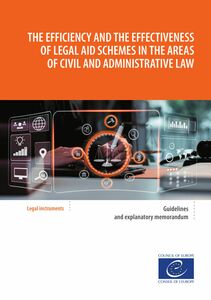
The efficiency and the effectiveness of legal aid schemes in the areas of civil and administrative law
Guidelines and explanatory memorandum
Council of Europe
Access to justice is a vital element in the democratic process and one of the basic principles of the rule of law. Access to legal aid – the provision of legal advice, assistance and/or representation at either no cost or subject to a financial contribution – is crucial to ensure access to justice.
The guidelines on the efficiency and the effectiveness of legal aid schemes in the areas of civil and administrative law were adopted by the Committee of Ministers of the Council of Europe on 31 March 2021.
The guidelines take into account existing international, European and national standards relating to legal aid, and are built on the expertise of the European Committee on Legal Co-operation (CDCJ) in legal aid policy and practice. They are designed to serve as a practical guide to support the implementation of existing standards, without necessarily changing organisational frameworks in place, in order to strengthen national legal aid schemes in the areas of civil and administrative law.
The guidelines include generic solutions on issues such as early intervention with the help of legal aid systems (preliminary legal aid), quality assurance mechanisms in legal aid schemes, means and merits testing, organisation of legal aid system and availability of legal aid providers, and data collection. Further guidance is available in the accompanying explanatory memorandum of the guidelines.
This publication is aimed at decision-makers and practitioners working to develop and improve the functioning of legal aid schemes at national level. It also aims to support member States’ efforts towards the implementation of the 2030 Agenda for Sustainable Development vision of a “just, equitable, tolerant, open and socially inclusive world in which the needs of the most vulnerable are met”, and notably SDG 16.3’s promises to ensure equal access to justice for all.Book details
-
Publisher
-
Original text
Yes -
Language
English -
Publication date
-
Page count
34 -
Theme






